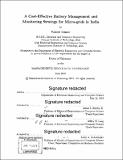A cost-effective battery management and monitoring strategy for micro-grids in India
Author(s)
Kumar, Rakesh,Ph. D.Massachusetts Institute of Technology.
Download1122780324-MIT.pdf (27.14Mb)
Other Contributors
Massachusetts Institute of Technology. Department of Electrical Engineering and Computer Science.
Advisor
James L. Kirtley Jr. and Jeffrey H. Lang.
Terms of use
Metadata
Show full item recordAbstract
Energy buffer cost is a key factor in rural electrification, electric vehicles, mobile devices, etc. Increasingly, micro-grids and off-grid home electric systems have become popular in the developing world to help meet energy demands. These systems help provide electric power to customers when the main power utility is unable to do so, such as in rural communities or newly developed townships. However, a major limitation of micro-grid expansion is the system cost, with the energy buffer accounting for perhaps 50% of the cost. This work addresses such costs by addressing battery longevity through the creation of a cost-effective and easy to use battery monitor that helps off-grid system operators increase the lifetime of the battery system. This work also explores methods of extracting battery health information from existing off-grid batteries to help determine remaining battery life. To this end, a very inexpensive device capable of extracting state-of-charge (SoC) and state-of-health (SoH) is proposed and validated against data from existing battery test equipment. This work then develops an optimal depth of discharge model which can be built solely from manufacturer data. Such a model helps micro-grid operators understand the effects of different operational conditions on battery life. Finally, this work experimentally studies the degradation impact of extreme battery cycling scenarios. Examples include high discharge currents or low battery voltage cut-off. These results, combined with manufacturer data, lead to the synthesis of recommendations on how to size and operate the battery system to maximize lifetime using the proposed SoC/SoH monitoring device. By leveraging these optimal operating recommendations and monitoring tools, micro-grid operators may extend total battery throughputs by 35-40%, thereby reducing overall micro-grid system costs by up to 20%. For the purposes of this work, the focus will be on lead-acid batteries as they are the most common type of battery used in off-grid settings.
Description
This electronic version was submitted by the student author. The certified thesis is available in the Institute Archives and Special Collections. Thesis: Ph. D., Massachusetts Institute of Technology, Department of Electrical Engineering and Computer Science, 2019 Cataloged from student-submitted PDF version of thesis. Includes bibliographical references (pages 165-170).
Date issued
2019Department
Massachusetts Institute of Technology. Department of Electrical Engineering and Computer SciencePublisher
Massachusetts Institute of Technology
Keywords
Electrical Engineering and Computer Science.